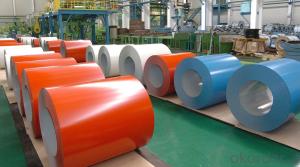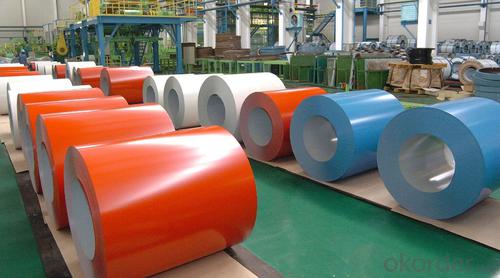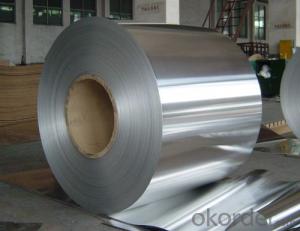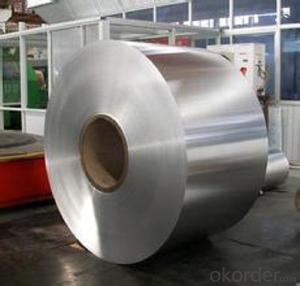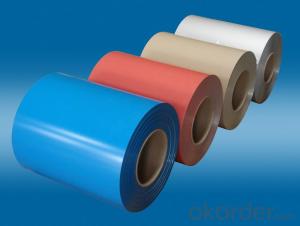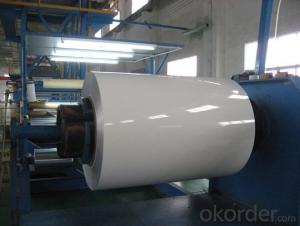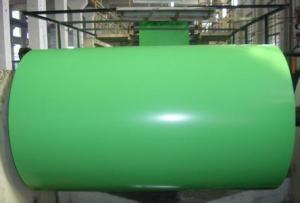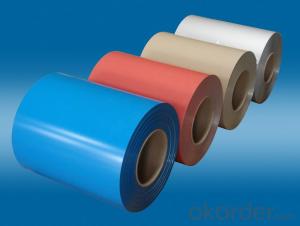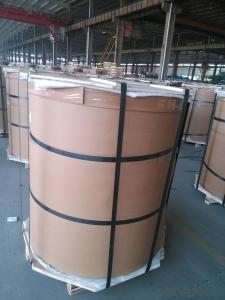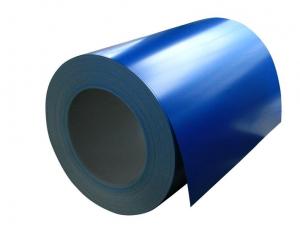Aluminum Coil White AA3003 Prepainted Aluminium Coils Used for Construction
- Loading Port:
- Shanghai
- Payment Terms:
- TT OR LC
- Min Order Qty:
- 5 m.t.
- Supply Capability:
- 10000 m.t./month
OKorder Service Pledge
OKorder Financial Service
You Might Also Like
Specification
1.Structure of AA3003 Prepainted Aluminium Coils Used for Construction Description
AA3003 Prepainted Aluminium Coils Used for Constructionare widly used in decoration field. For the painting, it depends on the using evironment. If you use in the open air, we recommend the PVDF coated aluminium coils. This kind of painting can last 15-20 years. If you use in the room, we recommend PE coated aluminium coils. The price is much more competitive.
Direct Continuous Aluminium Foil Stock in Coil is one semi-finished aluminium material. This strip can be rolled down to aluminium foil.The final thickess can be 5-20 microns. Aluminium foil is soft, ductile and with a silver-white luster which can be widely used in a large scare of fields.
2.Main Features of AA3003 Prepainted Aluminium Coils Used for Construction
a.Competitive price---We have our own mills and can produce mill finished aluminium coils, so we can control the production cost better.
b.Professional after-sale service---We have more than 15 years exportation experience and you need not worry about the exporation problems.
c.Fast delivery time---We can control the delivery time within 35 days.
3.AA3003 Prepainted Aluminium Coils Used for Construction Images
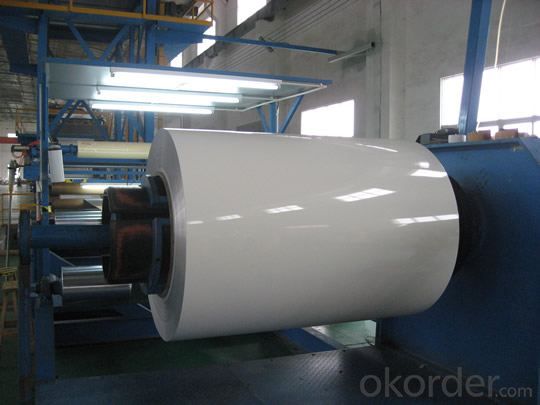
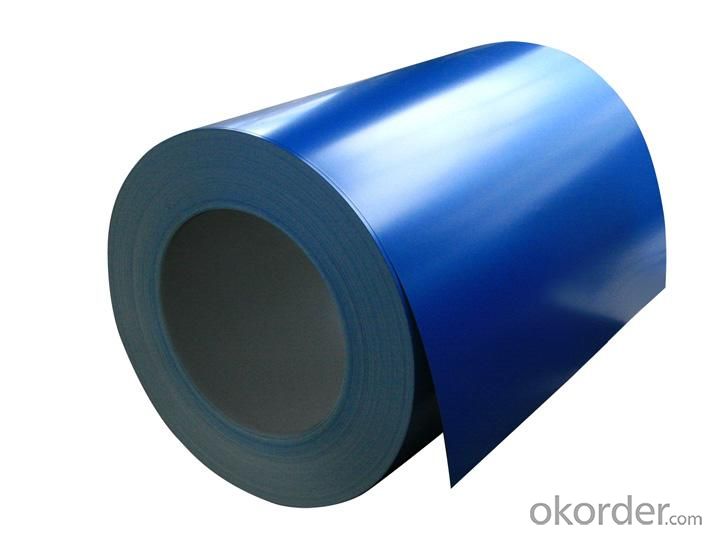
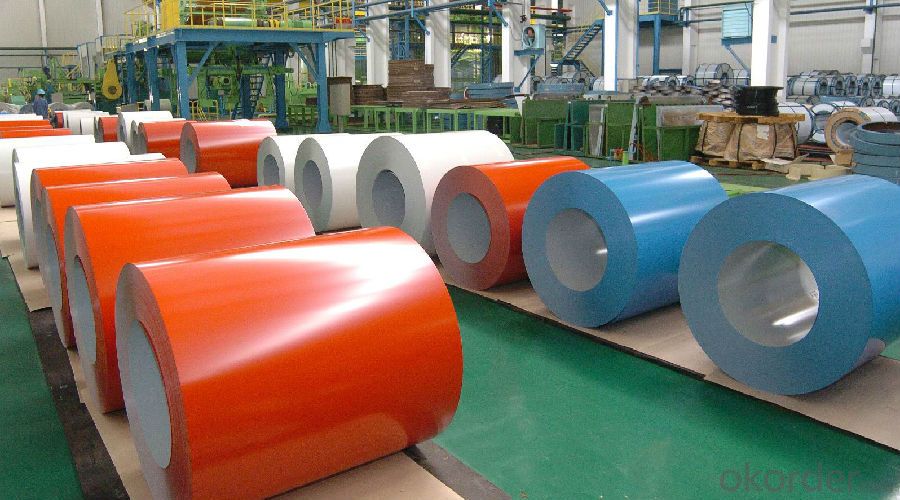
4.AA3003 Prepainted Aluminium Coils Used for Construction Specification
Alloy | AA3003 |
Temper | H14,H16,H18,H22,H24,H26,H32,O/F |
Thickness | 0.03mm-3.0mm |
Width | 30mm-1700mm |
Coating | PE,PVDF,Epoxy |
Painting Thickness | Standard 16-25 Mic, max 40 Mic |
Color | According to RAL colors or customers' samples |
Standard | GB/T 17748-1999 |
5.FAQ:
What is the quality standard?
---Usually our standard is GB3880-2006
What is the largest width?
---It is 2000mm
What is the MOQ?
---Usually we can accept 80 tons.
- Q: my text says aluminium does not corrode much as a passive aluminium oxide layer is formed on it.Well other metals such as sodium adn potassium also form oxides. Why dont their oxides prevent further oxidation ?
- sodium oxide and potassium oxide are water soluble aluminium oxide is not water soluble. the layer formed of oxide on the aluminium surface is coherent and adherent with no pores and stuck to the metal surface. the layer is also passive to most acids and alkalies except HCl and anti passive ions if present. sodium oxide and potassium oxide dissolve in any aqueous medium forming the corresponding alkalies NaOH and KOH leaving the fresh metal surface exposed to more corrosion. also the reaction of Na and K with aqueous media like water and acids is quite vigorous and fast unlike aluminium which is mu less reactive
- Q: What are the thickness tolerances for aluminum coils?
- The thickness tolerances for aluminum coils can vary depending on the specific grade and alloy of aluminum being used. Generally, the tolerance range for aluminum coil thickness is within +/- 0.003 to 0.015 inches (0.076 to 0.381 mm). However, it is important to note that different industries and applications may have their own specific requirements and tolerances. It is recommended to consult the relevant industry standards or specifications to determine the precise thickness tolerances needed for a particular application.
- Q: Is it possible to use a crowbar as a tool for opening an aluminum coil?
- <p>While a crowbar can be used to apply force to open various objects, it may not be the most suitable tool for opening an aluminum coil. Aluminum coils can be sharp and using a crowbar could lead to injury or damage to the coil. It's recommended to use gloves and a pair of pliers or a coil cutter specifically designed for handling aluminum coils to ensure safety and avoid damaging the material.</p>
- Q: What are the common transportation methods for aluminum coils?
- Aluminum coils can be transported using various methods such as trucking, rail, and shipping. When prompt delivery or short distances are involved, trucking is commonly employed. To ensure secure transit, aluminum coils are loaded onto specialized trailers equipped with cradles or coil racks. This approach provides flexibility and easy access to different locations. For long-distance shipments, rail transportation is frequently utilized. Railcars specifically designed to accommodate the weight and dimensions of aluminum coils are used for loading. This transportation method is advantageous due to its cost-effectiveness and ability to transport large quantities of coils in a single shipment. When it comes to international shipments, shipping by sea is a popular choice. Aluminum coils can be loaded onto cargo ships either in specialized containers or directly on the ship's deck. Shipping offers the benefit of transporting large volumes of coils over long distances and is often preferred for global distribution due to its efficiency and cost-effectiveness. Ultimately, the choice of transportation method for aluminum coils depends on factors such as distance, urgency, quantity, and destination. Companies must carefully consider these factors in order to determine the most suitable transportation method for their specific needs.
- Q: What are the potential applications of stucco-embossed aluminum coils?
- Stucco-embossed aluminum coils offer a multitude of potential uses due to their distinct properties and attractive appearance. Here are some possible applications for stucco-embossed aluminum coils: 1. Construction: Stucco-embossed aluminum coils are commonly employed in the construction sector for cladding and roofing purposes. The textured pattern strengthens and enhances the durability of the aluminum, making it suitable for external applications. It can be utilized on both commercial and residential buildings to provide a visually pleasing and long-lasting finish. 2. Insulation: Stucco-embossed aluminum coils can also serve as insulation material. The textured surface increases the material's surface area, thereby improving its thermal conductivity. This makes it an excellent choice for applications where heat transfer needs to be regulated, such as HVAC systems or refrigeration units. 3. Appliances: The manufacturing of various appliances often incorporates stucco-embossed aluminum coils. The textured surface not only adds visual interest but also provides a robust and easy-to-clean finish. It can be used in the production of kitchen appliances like refrigerators, dishwashers, and ovens, as well as other household appliances like air conditioners or water heaters. 4. Transportation: Stucco-embossed aluminum coils also find applications in the transportation industry. The textured surface enhances traction, making it suitable for vehicle flooring and decking in buses, trains, and ships. It is also used for decorative purposes in the interior and exterior parts of automobiles, imparting a stylish and modern appearance. 5. Packaging: Stucco-embossed aluminum coils can be utilized in the packaging industry. The textured surface adds strength and rigidity to the material, making it ideal for manufacturing durable containers, trays, and packaging materials. It is suitable for food and beverage packaging, pharmaceutical packaging, and various other applications where a sturdy and visually appealing packaging solution is required. In conclusion, the uses for stucco-embossed aluminum coils are diverse and adaptable. From construction to insulation, appliances to transportation, and packaging to various other industries, stucco-embossed aluminum's unique properties and attractive appearance make it a popular choice for a wide range of applications.
- Q: What does 1060 of the 1060 Aluminum rolls stand for?
- Can aluminium rolls be classified into nine categories? One series is the 1060 series, which represents the 1050106010701000 series aluminum plate, also known as pure aluminum. In all the series, the 1000 series belongs to a series with the largest amount of aluminum.
- Q: What are the legal frameworks or regulations that control the manufacturing and distribution of aluminum coil?
- <p>Yes, there are regulations and laws governing the production and sale of aluminum coil. These often include environmental protection laws that regulate emissions and waste disposal, safety standards for manufacturing processes, and quality control regulations to ensure the product meets certain specifications. Additionally, trade laws and tariffs may affect the sale of aluminum coil, especially when it crosses international borders. Compliance with these regulations is crucial to avoid penalties and maintain a competitive edge in the market.</p>
- Q: Are aluminum coils easy to install?
- Yes, aluminum coils are generally easy to install. They are lightweight and flexible, which makes them easier to handle and maneuver during installation. They can be easily cut and shaped to fit the specific requirements of the installation, and they are often available in pre-cut sizes, further simplifying the installation process. Additionally, aluminum coils are typically designed with features such as interlocking edges or snap-on connectors, which make it easier to join multiple coils together or connect them to other components. Overall, with the right tools and basic knowledge of HVAC installation, aluminum coils can be installed relatively easily.
- Q: How do aluminum coils compare to steel coils in terms of strength?
- Significant differences can be observed between aluminum coils and steel coils in terms of strength. Generally speaking, steel coils exhibit greater strength and durability when compared to their aluminum counterparts. This can be attributed to steel's renowned high tensile strength and ability to withstand heavy loads, making it the favored selection for applications that prioritize strength and durability. Conversely, aluminum coils possess a lower strength in comparison to steel. Aluminum, as a lightweight metal, exhibits a lower tensile strength, implying that it may not offer the same resistance to heavy loads or stress as steel coils. Nonetheless, aluminum coils boast other advantageous properties, including exceptional corrosion resistance and high thermal conductivity. The decision to opt for either aluminum or steel coils relies on the specific application and its requirements. If strength and durability take precedence, steel coils are generally the superior choice. However, if weight reduction, corrosion resistance, or thermal conductivity are of greater importance, aluminum coils may be the preferred option.
- Q: What are the different types of surface defects in aluminum coils?
- Some of the different types of surface defects in aluminum coils include scratches, dents, pits, stains, blistering, and oxidation.
Send your message to us
Aluminum Coil White AA3003 Prepainted Aluminium Coils Used for Construction
- Loading Port:
- Shanghai
- Payment Terms:
- TT OR LC
- Min Order Qty:
- 5 m.t.
- Supply Capability:
- 10000 m.t./month
OKorder Service Pledge
OKorder Financial Service
Similar products
Hot products
Hot Searches
Related keywords
